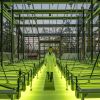Lignite mining region becomes a source of hope
A research centre aims to transform the Rhenish mining area into a real-world laboratory for sustainable management.

Jülich is a town in North Rhine-Westphalia, north-west Germany. It lies in the middle of the so-called Rhenish mining area, a region that was shaped for decades by opencast lignite mining. This form of energy represents just about everything that is no longer wanted in a sustainability-focused circular economy: high CO2 emissions, overexploitation of non-renewable resources, large-scale destruction of landscapes and biosystems. Jülich of all places is now to play a decisive role in designing a 'bioeconomy'. Bio-based economic systems are the focus of the Science Year 2020 in Germany. Furthermore, the Federal Government launched a National Bioeconomy Strategy at the beginning of 2020 laying down the guidelines and goals of its policy in this field.
Innovation laboratories for the bioeconomy
'From Lignite Mining Area to Bioeconomy Region' – is the name of an initiative launched by Forschungszentrum Jülich (Jülich Research Centre) with the participation of the universities RWTH Aachen and FH Aachen as well as the Fraunhofer-Gesellschaft. The aim is to transform the former lignite region into a model region for resource-efficient and sustainable economic activity. 15 innovation laboratories at the interface between science, business and agriculture are seeking to accelerate the transfer of new processes from science to industry.
For project lead Professor Ulrich Schurr, head of the Institute of Plant Sciences at Forschungszentrum Jülich, this is only one logical step in tackling the challenges posed by structural change as effectively as possible. "We use the innovation laboratories to implement effective measures throughout the area, thus improving the chances of preserving and creating sustainable jobs and genuine value creation."
Mini robots that recognize plants
There are also other reasons why Jülich offers optimal conditions for implementing the Federal Government's Bioeconomy Strategy: "We have a strong agricultural sector here that works closely with industry, for example in sugar-beet processing. There are many small and medium-sized companies that are already engaged in bio-based business, and also have markets for their products in the region," says Schurr. Equally important factors, he continues, are the chemical industry, which is strongly represented here and is also keen to use or process biogenic materials, and the commitment of a society that wants to achieve structural change.
In the weekly newspaper Die Zeit, Schurr describes the potential contribution the region could make to the bioeconomy research field. In the future, robust new plant varieties will be tested on the degraded soils of open-cast mines to counteract land shortages and climate heating. Miniature agricultural robots will make ecological mixed crop cultivation possible because their sensors can recognize the plants and harvest them selectively. And special bio-refineries can tailor raw materials to the needs of regional pharmaceutical, food or chemical companies.
You would like to receive regular information about Germany? Subscribe here:


